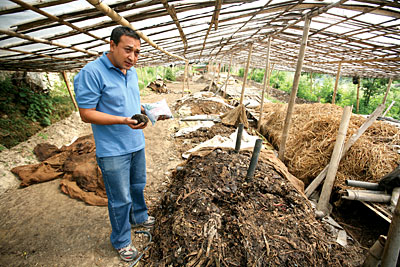 KIRAN PANDAY |
Kathmandu could be a whole lot cleaner if only we used a little ingenuity in solid waste management. Of the 500 tonnes of solid waste generated in the valley everyday, 66 per cent is biodegradable. That means 330 tonnes could be transformed into compost, with the remaining 170 tonnes easily managed by the municipality.
"The problem with solid waste management has more to do with a lack of awareness than inadequacy in systems of garbage collection and disposal," says Deepesh Budhathoki. He should know. He has been manufacturing compost from the solid waste of Kalimati Fruits and Vegetables Market for the last two years.
Budhathoki collects about 25 tonnes of waste from the market every day, separates degradable from non-degradable waste, and transports the former to his factory in Chobhar for further processing. His company, Nepal Kalpabriksha Management and Trading, employs 14 people and produces one tonne of compost a day. He aims to increase production to 8 to 10 tonnes a day. From this month on, he will also be collecting waste from New Baneswor. The municipality has offered help in transporting household wastes to his factory.
Budhathoki has made a profitable enterprise out of garbage. People come to his factory to buy compost by the packet, mostly for gardening and vegetable farming. Compost is considered a better fertiliser because unlike chemical fertilisers, which lead to a gradual decline in soil quality, compost maintains the fertility of the soil, prevents diseases and is not hazardous to health. Bio-controls inoculated into compost also reduce fungal disease and work as a nitrogen fixer.
But people still prefer chemical fertilisers to organic compost, according to Budhathoki. One reason may be the subsidies offered by government on chemical fertilisers, another may be the attraction of an instant boost in yield, whatever the long-term damage to soil.
Ironically, the demand for fertiliser � about one million tonnes � may play into the hands of entrepreneurs like Budhathoki. There was an acute shortage of fertiliser this year as government could only supply a hundred thousand tonnes. If there were mass production of compost, we could not only help meet farmers' demand, but also reduce dependency on chemical fertilisers and manage garbage in our cities. "The government should take the initiative to gradually reduce chemical fertiliser imports and end dependency, like the Philippines did," says Budhathoki. The Philippines may not have been able to reduce imports, but 85 per cent of its fertiliser imports and over
90 per cent of its pesticide imports are organic.
Budhathoki also grows organic vegetables over 4 ropanis of land near his factory, where he explains the benefits of organic farming to interested visitors. He sells his organic produce at the same price as regular vegetables. "Since there is no market for organic produce in Kathmandu, we have to sell them at market price. People don't care much about the difference in organic and non-organic products," he says. Such a pragmatic, action-oriented approach may be what is needed if we are to promote organic fertilisers and organic food, and deal with the organic waste in our cities.
READ ALSO:
Farming diesel


